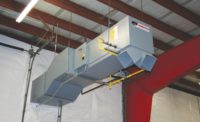Uponor is a longstanding company that aims to stay on the cutting edge of construction materials. Thirty years ago, Uponor North America became one of the first companies to introduce PEX (crosslinked polyethylene) piping products to the U.S. market. Now, the company is promoting PP-RCT (polypropylene, random copolymer with modified crystallinity and temperature resistance) as an additional solution in a number of fields, including hydronics.
“Our new PP-RCT and Construction Services offerings, combined with our traditional PEX piping solutions, deliver a complete polymer solution for a wide range of commercial plumbing and mechanical projects,” said Bill Gray, president of Uponor North America. “From half-inch diameter PEX to 12-inch diameter PP-RCT, our piping solutions meet the performance, durability, and safety needs of the entire commercial structure.”
Other parts of the world have used polypropylene for years. It’s popular in Europe and the Middle East. Now Uponor is promoting it as an alternative to metal piping, as it fills a need for larger diameters (more than 2 inches). Doug Fulton, Uponor’s vice president, said PEX works on larger diameters but starts to lose some of its benefits, such as flexibility.
The main competition for PP-RCT is copper, Fulton said. He said there are several advantages to PP-RCT. One is a more stable price. Copper and other metals fluctuate based on the commodity markets. Copper prices shot up last year, rising to more than $4.25 per pound from less than $3.50 per pound.
Lighter Material, Safer to Use
PP-RCT is also lighter than most metals. This has two benefits. One is that makes it easier to carry, requiring fewer workers. That helps address the labor shortage construction that companies face. The other benefit is the lighter material reduces the chance of a workplace accident.

SAFER SOLUTION: PP-RCT uses fusion rather than welding, reducing the risk of injuries at construction sites. (Photo Courtesy Of Uponor)
Matt Denny, PP-RCT business development manager at Uponor, said the material aids workplace safety in other ways. One is by reducing the need for welding. PP-RCT also eliminates the need for grinding, Denny said, which reduces the risk of an eye injury. It is also easier to maneuver.
PP-RCT is resistant to corrosion, scale build-up, and other erosive activities. This means while the pipes still need some ferrous, they don’t require the same amount of chemical treatment as other materials. Denny said the lightweight property puts less stress on a building. It is also quieter.
“Everything we do in terms of driving our innovation is trying to solve problems for our customers,” Fulton said.
The CT in the Uponor product is important. The company state that a PP-RCT piping system has higher temperature and pressure ratings than PP-R pipe, as well as lower levels of expansion and contraction.
Selling to Commercial Contractors
Uponor initially announced its entry into the North American PP-RCT market in September 2019 through a partnership agreement with Pestan North America. As a result, Uponor is now marketing approximately 270 pipe and fitting products in the U.S. in sizes up to 12 inches in diameter and with plans to expand up to 24 inches. Despite the positive attributes of PP-RCT, it still meets resistance after more than a year, especially for commercial use.
“The commercial side of the business has just been more reluctant to change materials,” Fulton said.
To help promote PP-RCT and better serve its customers, Uponor recently introduced Uponor Construction Services. This service features regionally based designers, as well as a team of BIM experts. Using the design and estimating tools, the Uponor team of designers and project managers offers a deep menu of design and construction services at no charge.
Launching this new service during the pandemic has been challenging. Andrew Koppi, one of Uponor’s Construction Services managers, said the plan had been for plenty of face-to-face meetings. Of course, that wasn’t possible. Instead, Uponor is focusing on getting the word out via social media and webinars. Koppi said that’s working, but he prefers the personal touch.
“Any remote environment is challenging,” he said.
Stephanie Radel, another Construction Services manager, said she’s ready for the trade show circuit, whenever it reopens, but she said there have been some benefits to this approach.
“It opens the door to additional people,” Radel said.
‘The PEX Guys’
The biggest challenge for Uponor is selling contractors on a new solution after spending the past 30 years establishing itself as “the PEX guys,” Grey said. That’s part of the reason for the shift in focus to Construction Services.
“It’s big — not only the impact of what it brings to the market, but the change that it’s bringing inside our company,” he said.
Of course, it wasn’t long before Uponor started promoting PEX that the entire hydronics segment changed from radiators to producing heat from inside floors, Grey said. Now Uponor needs to show how moving to PP-RCT will give contractors an edge as the commercial market faces challenges from the pandemic, including a lack of new construction projects. Grey said he knows the benefits but understands the need to educate contractors.
“It’s always about creating confidence in the ones who are putting their names on that work at the end of the day,” he said.








